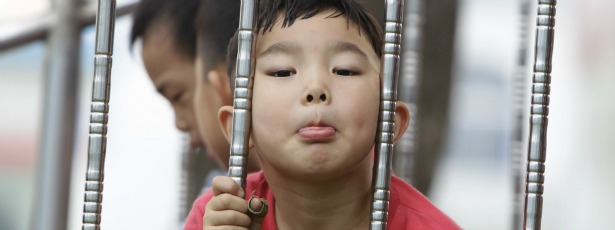Study: The New Less-Social Psychology of China's Generation Without Siblings
The new only-child generation grew up to be less trusting, more risk-averse, less competitive, more pessimistic, less conscientious, and it appears, more neurotic.

PROBLEM: China's one-child policy, introduced in 1979 and strictly enforced, succeeded in slowing population growth. The first of the children who were born -- one per family, under threat of heavy penalties and by means, for some, of forced sterilization -- are now fully grown. What does it mean, for them and for China, that an entire generation grew up without siblings?
- During the 2010 World Cup, rates of domestic violence in England increased by 30 percent. Except after ties.
- Monkeys Can't Pick Up Musical Beats
- Midnight Snacks Mess Us Up on a Molecular Level
METHODOLOGY: Researchers at a university in Australia seized on the natural experiment created by the Chinese government, recruiting thirtysomethings from Beijing who had been born before and after the one-child policy was implemented. The study had a small sample size, of about 421 participants, that nonetheless marked a large change in demographics. Despite being close in age, they were from vastly different generations, from those who were born in 1975, when only about a quarter of Chinese families had only children, to those born in 1983, where the number rose to 91 percent.
The participants played a variety of "Deal or No Deal" style econ games designed to test behaviors and attitudes with real-world social and economic correlations.
RESULTS: Compared to children born right before the one-child policy was implemented, children born under its jurisdiction scored lower on a whole spectrum of measures: They grew up to be less trusting, more risk-averse, less competitive, more pessimistic, less conscientious, and it appeared, more neurotic.
In one example, 66.4 percent of children born pre-policy were willing to invest 100 yuan with a 50/50 risk of tripling their return or losing it all, while only 51.8 percent born after took the risk.
The only children were also less likely to hold risky jobs, like self-employment or a position in finance. The differences were seen even between people born one year before and after the policy's introduction.
Spending a lot of time around peers while they were growing up was no substitute for siblings, the researchers found as well. This "sibling deprivation" was associated with them being more self-centered and less cooperative.
CONCLUSION: Children born after the introduction of the one-child policy developed different, less social psychologies from the previous "generation," born as little as two years earlier.
IMPLICATIONS: The findings the China's only children have fewer of the qualities necessary for being social and entrepreneurial, compounded across an entire nation, may very well have real world implications in the global marketplace, say the authors.
The research also highlights the unique circumstance of families being forced to limit the number of children they have -- other studies have found that only children in the West, whose parents are more likely to have made the conscious decision not to give them siblings, do not differ much from their non-sibling deprived peers.
The full study, "Little Emperors: Behavioral Impacts of China's One-Child Policy," is published in the journal Science.
